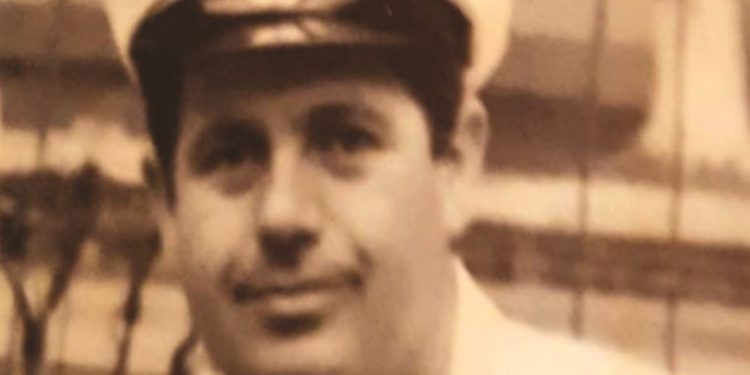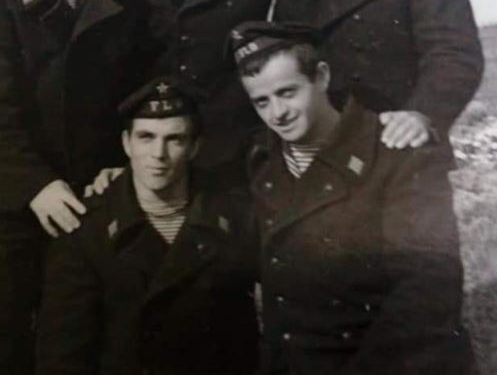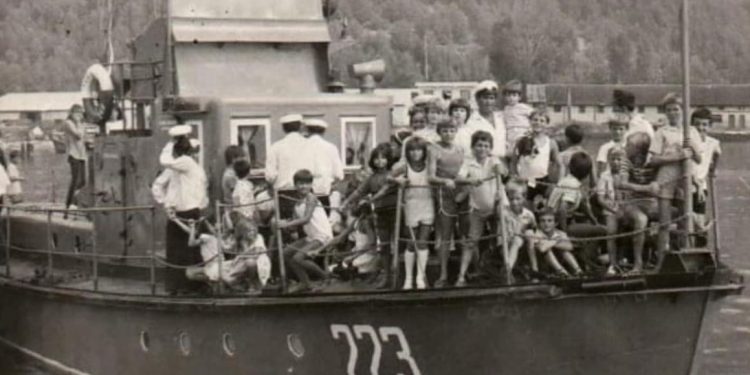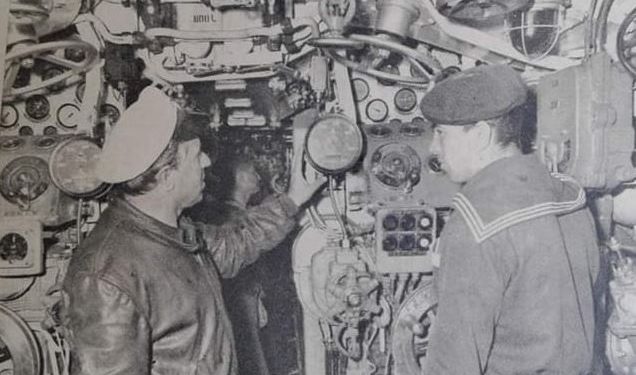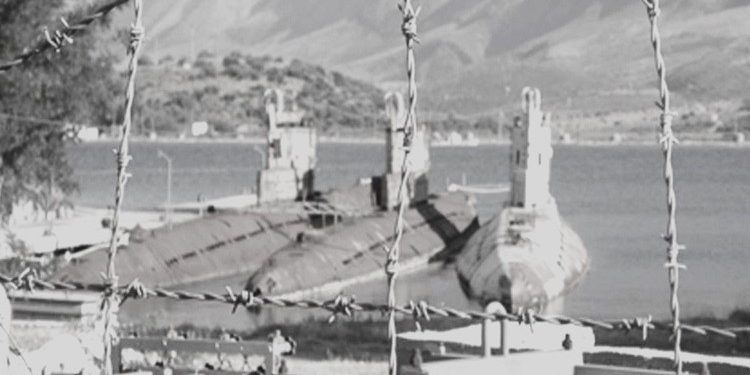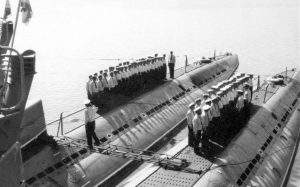Memorie.al / It were March 1968. The aroma of mimosas permeated Tirana. Everything had begun to bloom and don the colors of spring. The greenery was increasing, and movement and vitality in the capital had livened up. While the trees and flowers were opening and dressing in the costume of the season, people began to shed their winter clothes, and human beauty and grace started to blossom in the spring radiance. For the cadets, the time had come to take flight. It was an order from the Ministry of People’s Defense that sharply cut short our dreams of our age and life in Tirana. A group of 10 of us, former “Skanderbeg cadets,” were to go urgently to Pashaliman, to the Submarine Brigade. It was the call of the Homeland. We left behind the strolls, we left the youthful dreams, we left “Skanderbeg Square,” the cinemas, the theater, some even left a love that had just begun to bud, and we prepared for Pashaliman.
We were 10 friends: Sabri Çelmeta, Bashkim Maska, Mëhill Marku, Gëzim Dyrmishi, Pjetër Deda, Rexhep Kapllani, Shefki Barolli, Filip Kllapi, Hysni Demiri, and Aristidh Mitro. Each of us experienced this departure with concern – to the bastion of the Cold War, to the heroic Pashaliman, as it was throughout history, but especially during the heroic events of 1960-’61 with the Soviets. We had heard about the events at the Submarine Base in 1961, while about submarines, we only knew the fantasies of the great Jules Verne.
For us, submarines were a myth, a mystery, but also an anxiety. We were young. We had spent four and a half years in Tirana. A veil of responsibility, anxiety, but also pride for the heroism of that base and the heroic Albanian cadres and sailors was woven across each of our faces, as we had heard about them when the events in Pashaliman were front-page news. And precisely this myth and this mystery made us forget what we left in Tirana. Six of us were classmates, and four were from the same year but a different class.
To pick us up, an officer from the Submarine Brigade headquarters, Sherif Danaj, came – a short man in stature, but kind-hearted, ruddy, wearing a uniform that didn’t fit him too well, who prepared the next cigarette without extinguishing the one he had, and who tried with his conversations to make our departure from Tirana to Pashaliman easier. Rightly, a friend in later years compared Pashaliman to a non-return valve that allowed you to enter Pasha, but would make it difficult to leave there. Sherifi, to distract us from the difficulties of the submarine, introduced us to the world of curiosities about underwater navigation and the role and duties of submarines. Later, I had the fortune to have him as the head of the Political Apparatus in the Brigade, when I also worked in the political apparatus, and for whom I cherish the best memories.
We were good friends with each other during our years at the “Skënderbej” school. Sabri Çelmeta, the good man from Pezë who lived in Durrës, who knew the sea, although upset about what we left behind, tried to entice us along the long and difficult road of that time, Tirana – Pashaliman. Similarly, Gëzim Dyrmishi and Rexhep Kapllani, also from Durrës, seemed to be handling their own departure more lightly, and would crack a joke to clear the various clouds swirling in our minds.
From the moment we entered the checkpoint until the command headquarters, we sought to see the submarines, which were anchored at the quay, long and wide, and it looked as if they were resting a bit before starting other combat voyages and duties. “There they are!” Gëzim pointed his finger, and only a part of their hull was visible on the surface. “How deep are they?” asked Pjetër, who was the quietest. We were tired and hungry. A long journey. With little money in our pockets, just enough for a “snack.” In the command courtyard, we were greeted by the Chief Engineer of the Submarines, Luan Cukalli – also a short, physically thin man, but he kindly hugged us and welcomed us to these mysterious yet heroic ships.
We looked at him and at each other. Luan ushered us into the office of the Brigade Chief of Staff, Petrit Myftiu, also a short man, whose eyes sparkled with intelligence and kindness. He asked us one by one, congratulated us for choosing to come to the Submarines (no one asked us when we were assigned), introduced himself, and just to shake us out of our state of tiredness, anxiety, and hunger, he said: “Welcome, lads! You will be the future of our submarines. It will be a little difficult for you to adjust, but we will be together. Look! Luan and I arrived just like you. I see you are tired and need some food. Welcome!”
Luan escorted us to the mess hall and arranged for whatever could be found: roast meat, salami, kashkaval cheese, pasta, some fruit, compote, etc. “And after they eat, show them the room where they will be accommodated,” he told Luan. “Success, lads!” He mentioned foods we had not heard of, and we winked at each other. One of us said: “They’re greeting us like this at first to win us over!” Meanwhile, our friend Pjetër Deda intervened, upon hearing the menu the chief mentioned: “Comrade Chief – sign my name for the Submarine forever,” and laughter erupted. We were unfamiliar with the sea. Rexhepi jokingly kept saying along the way: “Why did they pick us, lads?! Was there no one else like us in the whole school?” The most unfamiliar with the sea were me, from Lezha, Pjetri from Shkodra, and Bashkim from Kolonjë, who had come to Tirana.
“Oh dear,” said Bashkim Maska, hitting his forehead with his hand! “They found us like grains of corn. Those who made the list must have been clever. They chose us like grains of corn. Come on – Bashkim concluded – we can’t do anything about it!” “We’ll get used to it like the others,” Sabri gave us courage. They received us with honors and special care. We settled into the sleeping room. Every day, the Brigade Commander, the legendary Mark Plani, would come to meet us and inquire about us and our living conditions. With his conversations, his humor, and his characteristic Shkodran vocabulary, with that pronounced “sh” before every word, he eased our adjustment to Pashaliman.
The next day, we remained stunned as we watched the submarines stretched out at the quay or gliding on the water, either leaving or docking at their pier. We heard engine noises, commands, and light and flag signals. Everything was buzzing. It was the life of the Albanian submarines. Bashkim Maska would crack a joke: “Oh dear – and he hit his forehead with his hand! – Are we going to enter the submarine too?! It’ll be a miracle if we come out alive!” – so much so that it made us think about what might await us, as well as laugh and joke about ourselves, as each of us had fallen into thoughts about the future.
We began to think and mentally enter the hull and the life of that mysterious ship that seemed to be waiting for us. And it didn’t take long…! On March 18, 1968, we would embark on our first voyage underwater and on the sea. We couldn’t sleep all night. Sometimes Rexhepi, sometimes Bashkim, would crack a joke, making us laugh reluctantly. Pjetri was covered head to toe, as if he was sleeping, but his movements showed he was awake. Sabri intervened: “Sleep, lads, or we’ll fall asleep during the voyage on the submarine, and we’ll be ashamed!”
“Oh, out there on the sea, no sleep will catch us until we see the sunlight with our own eyes,” Rexhepi said, looking us in the eye. I, being a year older than them and from Mirditë, tried to act brave, but it was futile. Curiosity, but also anxiety and fear, prevailed in each of us. “We’ll get used to it like the other friends, as those who have been in submarines for years have, and nothing has happened to them,” Gëzim gave us courage. “Let’s sleep now,” Sabri said, and from the silence, it seemed like we fell asleep, but the movements beneath the blankets indicated the anxious experience of the next day’s voyage.
Pjetri didn’t peep, not out of fear, but out of indifference, and our chatter was enough for him, so he was also a part of our conversation. And the next day came very quickly. We would all go out to sea together with the first submarine, commanded by Aleko Pojani. The combat alarm was given in the submarine: “Man your stations, prepare the submarine for combat and navigation.” We opened our eyes and looked at each other, surprised. Navigation, fine, but where did that word “combat” come from, on the very first day?! “We’re done for, lads,” Bashkim said in a low voice. “We’re gone too,” said Rexhepi. “This is it!” “Is it combat that fate has brought us to?” said another.
Everything was like in wartime. Command, signals, lightning-fast movements, quick actions and reports, engine starting, control of the submarine for airtightness, the noise of countless aggregates and apparatuses, reports to the central post from where the submarine was commanded. Everything was synchronized as in an artistic ensemble, a combat one; I wanted to say, with the colors of war. In our ears, sometimes the high-pressure air noise buzzed, sometimes our ears swelled from the vacuum as the ship’s airtightness was checked, and we were advised to swallow to relieve our ears, and so we did. A perfect order and discipline that amazed us.
The submarine resembled a factory with all its various departments. We heard words and names never heard before, professions and combat posts, where every sailor and cadre accurately performed their duties, their combat logbook, and the combat number that every sailor had as a label in their shirt pocket. We stood stunned, all hunched over and scattered throughout the compartments or in the central post in the third compartment. Through the radio translation, or the speaking tube that ran through the entire hull of the submarine, orders were given, commands, duties were conveyed, and reports on their execution were made. In the submarine, there was only one: “yes and the given command and reports on their execution were repeated.
The submarine was divided into seven compartments, communicating through rectangular doors and round hatches. The entire crew focused their attention on the submarine commander and the mechanical engineer, in whose minds and hands lay the lives of the crew and the submarine. The crew saw the commander not only as a man of extraordinary abilities and knowledge but also as a savior. “What kind of man must this be, to know all these things?” Rexhepi said, and our eyes and minds remained fixed on the commander, who was a mythical figure for the submarine, as the crew’s lives depended on him.
The mechanical engineer was the electronic brain of the submarine, which, together with the commander, ensured the submarine’s safe navigation underwater and on the surface, up to a depth of 200 meters. We followed everything with attention and curiosity. Occasionally, our eyes glanced at the depth gauge, which showed the depth of the underwater navigation. The underwater exercise began. “Diver, dive, hold it at a depth of 70 meters,” a command was heard. It was called a fight for the life of the submarine. And various emergency scenarios began to be given in the fight against water and fire in the submarine. We were stunned at first because we took the scenarios as real, thinking the ship’s hull was breached, and maybe water was coming in, or a fire had truly broken out!
We lost all color in our faces. When we saw sailors and cadres performing actions with jacks, planks, cushions, and emergency wedges, switching electrical fuses and circuit breakers, removing and inserting electrical fuses, with rubber gloves on their hands and with maximum concentration, we calmed down that these were not real incidents, but simulations of what could happen during a voyage. However, the maximum commitment of the crew in the combat posts and compartments was so great that it gave the impression that there truly was a breach in the submarine’s hull or an electrical arc.
During the execution of these scenarios, the commander, commissar, engineer, etc., would pass through the compartments, making assessments or necessary remarks on the liquidation of the “emergencies.” Everyone stood close to us and made our lives easier in the submarine, but the talented submarine engineer, Viktor Pashko, stayed closest to our group. He taught us about the submarine, educated us, and to this day remains our educator, friend, and companion, who hold his honored place among us at every meeting we have. Everything won us over. We, too, began to feel ourselves a part of the submarine and its combat crew.
Slowly, the curiosity, anxiety, and fear we felt when we first stepped onto the ship, when we saw all the sailors and cadres performing such rapid actions, as if they were in a real war, began to subside, and we too started to approach, to help a little, shy as we were, as if in a movie! Underwater navigation continued. Due to our unfamiliarity with the crew, we only exchanged occasional glances or smiles, as a sign of respect for their actions. It wasn’t long before a voice was heard from the speaking tubes: “Attention, attention! First, seventh, do you hear me?”
All compartment commanders reported that they heard well. “Man your stations, the submarine is set at the bottom! (On the seabed). Depth 70 meters. Diver, dive!” And the submarine began to dive into the depths. “This is what we needed too,” one of us said in a low voice. “Why did they have to execute all the most difficult scenarios today that we came, on our first underwater voyage?” Our eyes were glued to the depth gauge. Our faces were pale. How that whole ship would be placed on the bottom of the sea!? The diving continued, and we plunged into our anxiety.
The submarine took a slight trim at the bow, and the commander’s voice was heard: “We have settled on the bottom. Depth 73 meters. Listen for sounds outside the hull!” “The submarine,” they told us, “is now sleeping,” an old non-commissioned officer on the ship said teasingly. It was lunchtime. We were invited to the officers’ mess in the second compartment. We lined up at the dining table with plenty of food in front of us, but no one started eating. The deputy commander knocked on the commander’s cabin and reported: “Comrade Commander, lunch is ready.” He came and took his place at the head of the table. He took the wine glass and toasted: “Welcome, you knew cadres.” And after the commander, we all began. Our biggest surprise was the wine glasses.
To be submerged at the bottom of the sea and also drink wine, even just a glass which was the daily ration, for both cadres and sailors, seemed like an extraordinary thing to us, or how was it possible to drink wine even at great depths? We did not start drinking, with the excuse that we never drank it, but more so we were not drinking it out of fear and surprise!!! Later, we were clarified that underwater, in the organism of submariners, as a result of the microenvironment, air bubbles could form in the blood, which were dangerous to life, and that one glass of wine, and only one glass, served to eliminate these dangerous bubbles. We drank it too.
We were cruising deep to the west of Sazan, at a depth of 40 meters. A rule and discipline reigned that could hardly be found anywhere else. The commander gave various scenarios. We were amazed, and as we fixed our eyes and minds on him, Rexhepi said: “How clever this man is! Where does this man know all these things?!” The submarine sometimes submerged and sometimes surfaced at different depths, sometimes listing left or right, sometimes taking a trim at the bow or stern, to train the crew to keep the submarine in different underwater navigation positions. We were amazed and held on wherever we could.
We were the youngest in the submarine, both by age and, without a doubt, by seniority on the ship, as it was our first day of navigation. The cadres and sailors, with their seriousness, discipline, and maximum dedication in performing their duties, won us over. Curiosity, psychological burden mixed with emotion, fear, and anxiety. We watched and followed every command, every action, every movement, every sailor, and the life of the crew seemed heroic to us. We had lost the notion of time, even though our eyes often went to the depth gauge as well as the clock.
Commander Aleko called us to the central post, and smiling, with one eye glued to the periscope as he observed the surface of the sea, he asked us: “Well, boys! How did you find the voyage? Are you tired, are you bored? Life and navigation in a submarine are difficult, but everything will pass, and you too will quickly become capable of commanding the submarine and its combat units,” he encouraged us. “We too have sailed once, for the first time in a submarine.” He lifted our fatigue and anxiety as if by hand. “We will surface in a little while and return to base. Now you can stay here or go to the compartments,” and he commanded decisively: “Diver, surface! Torpedo man, blow the main ballast tanks!”
And the submarine rose sharply, bow up, to surface. Joy at coming out alive from the depths where we were spread across our faces. We too went out onto the command bridge after the commander, and from the sunlight, we began to squint our eyes. We were filled with fresh air. The submarine glided over the waves, as if it too was happy to return to base, leaving its wake and white foam behind. The submarine looked proud, the crew proud, and we too felt proud to have sailed and become part of this combat and heroic crew. In the morning, we entered the submarine as young men and came out as men, we entered with anxiety and fear and came out brave, and we came out more patriotic than in the morning. That day, we were baptized with the honored name: “Submariner”! / Memorie.al




